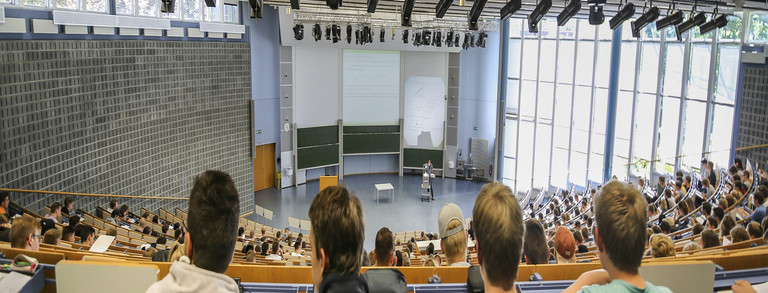Physics
Summary
| Degree | Master of Science (M.Sc.) |
|---|---|
| Subject group | Natural Sciences and Computer Sciences |
| Standard program duration | 4 semesters |
| Admission requirements |
none
|
| Start of studies |
Winter semester
Summer semester |
| Language | English |
| Enrollment requirements | |
| Further information | Website of Department of Physics |
| Department | Department of Physics |
Overview
Physics tries to measure quantifiable natural phenomena by means of specific experiments and to describe them theoretically by means of the simplest possible fundamental models. In constant cross-fertilization of experiment and theory, physics today has penetrated the realms of the largest dimensions - in astrophysics - as well as those of the smallest dimensions - in elementary particle physics. One of the guiding principles of the physics program at the Technical University of Dortmund is to anchor the integration of experiment and theory, which has been so successful in research, already in the education.
The Master’s degree program is divided into a one-year study phase and a one-year research phase. The study phase is dedicated to special and in-depth courses. In addition to further lectures and exercises as well as the advanced practical course, the study phase includes seminars in which the students themselves prepare papers on special topics.
The research phase begins with a research internship in a research group, which prepares students for the scientific work involved in writing the master's thesis. The possible specializations in the Master’s degree program are solid state physics, particle physics and medical physics. The range of courses offered by the Ruhr-Universität Bochum can be used in physics as well as in minor subjects by arrangement. In the master's thesis, a delimited topic from the current work of a research group is to be worked on, so that the end of the education is linked to the current state of research.
The Master’s degree program is equivalent to the traditional diploma degree in terms of content, level and study time.
Skills and knowledge
Prerequisite for enrollment in the Master’s degree program is a Bachelor’s degree program in physics with an overall grade of better than 3.0. The admission committee decides on the recognition of Bachelor’s degree program from other universities.
As of the winter semester 2023/2024, the program will be switched to English as the language of instruction. English language skills at level B2 are required for enrollment. For applicants with a German university entrance qualification, these can be demonstrated, for example, by the general university entrance qualification.
Field of activity
The traditional occupational fields for physicists are research, development and teaching, in the governmental (universities, research institutes, public authorities,...) and non-governmental sector (electrical industry, chemical industry, medical technology, mechanical and vehicle engineering...). The breadth of education in physics studies also increasingly opens up access to jobs in non-traditional fields, such as information and telecommunications, management consulting, and banking and finance, so that the job prospects of graduates, with or without a doctorate, are good even in economically difficult times. Decisive for the successful activity of physicists in both traditional and new professional fields are the broad-based basic education and the ability to analyze and solve complex technical-scientific problems developed during the course of study.
Additional information
The doctorate as an advanced degree involves the largely independent execution of an internationally competitive scientific project of several years' duration. No external internships are included in the study plan.
Various laboratory internships and the research internship in preparation for the Master’s project are integrated into the study program (cf. study structure).




![[Translate to English:] Partner Four hands are holding the green logo of TU Dortmund University](/storages/tu_website/_processed_/1/d/csm_Partner_Nicole_Rechmann_KW_40b35bb3fd.jpg)




![[Translate to English:] Forschung An apparatus with tubes in a laboratory](/storages/tu_website/_processed_/0/c/csm_Forschung_Juergen_Huhn_cbd34afd6d.jpg)
![[Translate to English:] Studium Five students are sitting in a lecture hall. They are talking to each other.](/storages/tu_website/_processed_/c/9/csm_Studium_FelixSchmale_81d94adc86.jpg)





